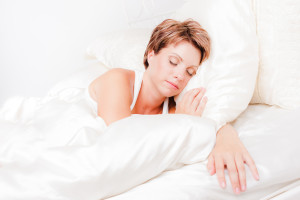Written by Angeline A. De Leon, Staff Writer. Auricular acupuncture significantly improved physical and psychological stress, cortisol levels and sleep quality in the 32 participating South Korean women.
 In Chinese medicine, the ear represents a microsystem of the body, showing direct or indirect connections with 12 of the body’s meridian systems (energy channels) 1. Based on this, auricular acupuncture uses the stimulation of responsive spots on the external ear as a natural therapeutic treatment for disease conditions 2. A number of studies support the efficacy of auricular acupressure therapy in improving various health functions in different population groups, including sleep efficiency in older adults 2, stress levels in female university students 3, and signs of depression in children 5. As a noninvasive, easy access, cost-effective form of therapy, auricular acupuncture may be particularly useful for middle-aged women, for whom depression, sleep, and appetite disturbances are more prevalent due to hormonal changes related to menopause 6. About 54% of women aged 45 to 69 years, for example, experience sleep problems 4. To establish the impact of auricular acupressure therapy on the menopausal symptoms of middle-aged women, a 2017 study in South Korea conducted an intervention trial to examine auricular acupuncture in relation to psychological stress, cortisol levels, and sleep status (sleep quality) in this age group.
In Chinese medicine, the ear represents a microsystem of the body, showing direct or indirect connections with 12 of the body’s meridian systems (energy channels) 1. Based on this, auricular acupuncture uses the stimulation of responsive spots on the external ear as a natural therapeutic treatment for disease conditions 2. A number of studies support the efficacy of auricular acupressure therapy in improving various health functions in different population groups, including sleep efficiency in older adults 2, stress levels in female university students 3, and signs of depression in children 5. As a noninvasive, easy access, cost-effective form of therapy, auricular acupuncture may be particularly useful for middle-aged women, for whom depression, sleep, and appetite disturbances are more prevalent due to hormonal changes related to menopause 6. About 54% of women aged 45 to 69 years, for example, experience sleep problems 4. To establish the impact of auricular acupressure therapy on the menopausal symptoms of middle-aged women, a 2017 study in South Korea conducted an intervention trial to examine auricular acupuncture in relation to psychological stress, cortisol levels, and sleep status (sleep quality) in this age group.
A total of 67 middle-aged women (aged 40 to 60) participated in a two-week double-blind, randomized controlled study. Prior to intervention and at the two-week post-assessment, participants provided blood samples for cortisol testing and completed a series of self-report measures designed to assess stress levels and sleep status. Auricular acupuncture involved the application of paper tape on the skin of the ear on five acupoints: (1) Sinmun (Spirit Gate, associated with stress relief); (2) Gyogam (sympathetic autonomic point, associated with balancing excessive excitement); (3) Pijilha (subcortex point, associated with anxiety reduction); (4) Naebunbi (endocrine point, associated with reducing oversensitivity of endocrine gland); and (5) Bushin (adrenal gland point, associated with controlling cortisol). In the treatment group (n = 35), skin paper tape including an auricular acupressure needle was applied to stimulate the five acupoints, while placebo controls (n = 32) received skin paper tape without a needle. Both groups were taped on the ear twice a week for two weeks.
Analysis of the data provided the following main findings for the acupressure treatment group:
Physical Stress: mean scores decreased from 15.49 to 13.49 (t = 2.170, p = 0.033)
Psychological Stress: mean scores decreased from 14.97 to 12.38 (t = 2.117, p = 0.037)
Cortisol Levels: mean scores decreased from 9.93 to 7.89 (t = 2.277, p = 0.025)
Sleep Status: mean scores increased from 37.54 to 40.38 (t = -3.127, p = 0.004)
Based on the results of the trial, auricular acupressure therapy was concluded to effectively mitigate stress and sleep disturbance, representing a potentially useful nursing intervention method for middle-aged women. Due to the regional specificity of the population sampled in the study, future studies are needed to replicate and further generalize the study’s findings.
Source: Cha NH, Park YK, Sok SR. Effects of auricular acupressure therapy on stress and sleep disturbance of middle-aged women in South Korea. Holistic Nursing Practice. 2017; 2: 102-109. DOI: 10.1097/HNP.0000000000000197.
Copyright © 2017 Wolters Kluwer Health, Inc.
Posted May 11, 2017.
Angeline A. De Leon, MA, graduated from the University of Illinois at Urbana-Champaign in 2010, completing a bachelor’s degree in psychology, with a concentration in neuroscience. She received her master’s degree from The Ohio State University in 2013, where she studied clinical neuroscience within an integrative health program.
References:
- Soh K-S. Bonghan circulatory system as an extension of acupuncture meridians. Journal of Acupuncture and Meridian Studies. 2009;2(2):93-106.
- Kim JY, Ryu HS, Nam SH, Park KS. Effects of auricular acupressure therapy on nocturia and insomnia in the elderly. The Korean Journal of Rehabilitation Nursing. 2014;17(1):1-9.
- Ro S-O, Lee H-Y, Lee J, Kim M. Effects of auricular acupressure on menstrual pain, dysmenorrhea, and academic stress in women college students. Korean Journal of Adult Nursing. 2013;25(3):356-364.
- Jehan S, Masters-Isarilov A, Salifu I, et al. Sleep disorders in postmenopausal women. Journal of sleep disorders & therapy. 2015;4(5).
- Kim JY. The Effects of Auricular Acupressure on Stress, Depression, Anxiety in Institutionalized Children in Korea [doctoral dissertation]. Seoul, South Korea: Chungang University; 2014.
- Kim MK. Effect of Aroma Inhalation on Middle Aged Women’s Depression, Stress and MenopausalSymptom [master’s thesis]. Gwangju, South Korea: Chonnam National University; 2003.
